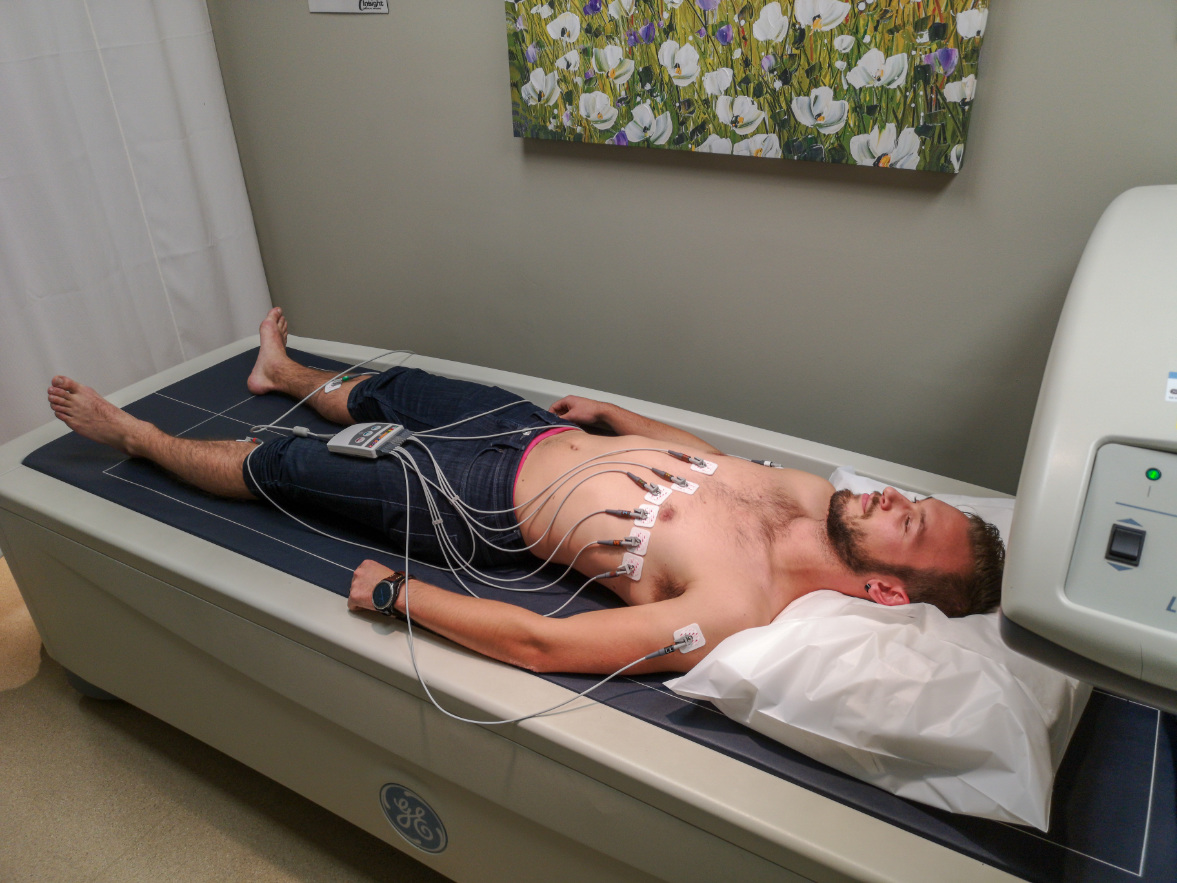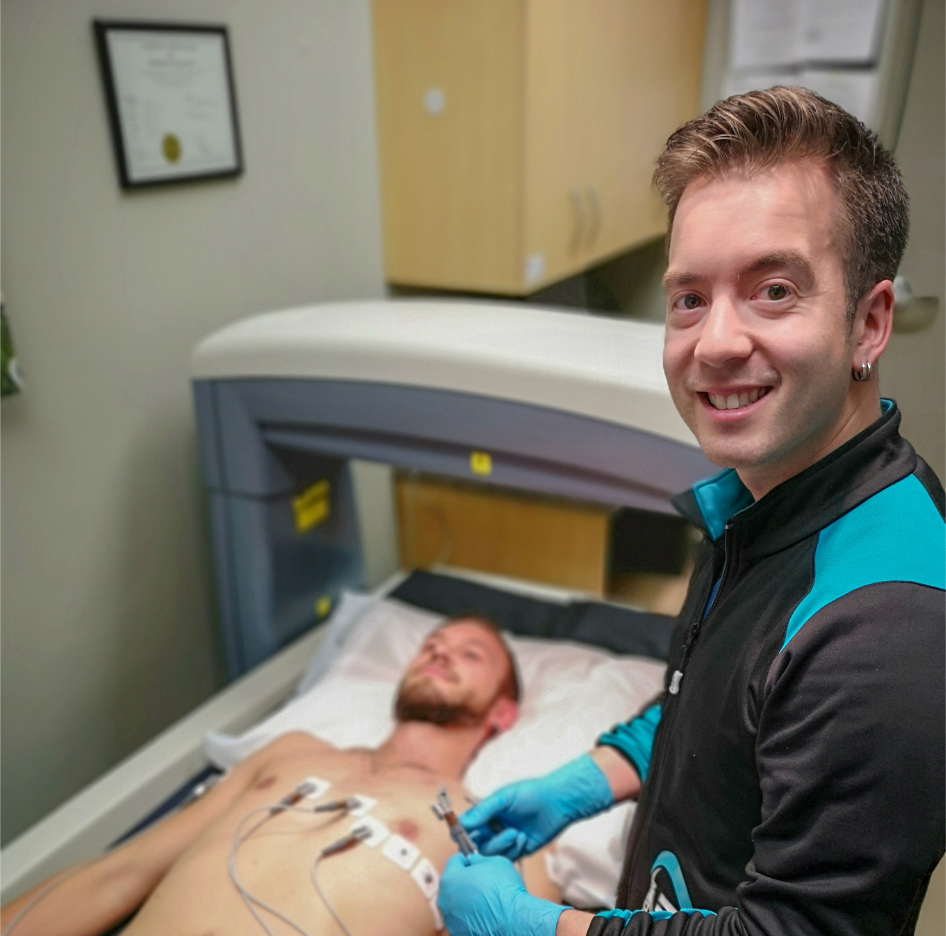
Walk-In ECG (Electrocardiogram)
ECG is a non-invasive procedure that records the electrical activity of the heart at rest. During an ECG, electrodes placed on the skin measure heartbeat regularity. The information gathered by an ECG procedure can be used to assess heart rate, rhythm, blood pressure (hypertension), and symptoms such as palpitations or chest pain (angina).
Insight Medical Imaging offers walk-in ECG exams at most of our Edmonton, Leduc, Spruce Grove, and Sherwood Park locations. All ECG services are first-come, first-serve, and cannot be booked in advance. If you are unable to take time off work during the day for your ECG, we recommend visiting a clinic that has extended hours in the evenings or over the weekend for your electrocardiogram exam.
Please bring the following with you when you come in for your ECG exams:
- The requisition from your doctor
- An Alberta Health Care card
- Photo identification
You can submit your requisition form in advance using our online form here.
Why Am I Being Referred to Get an ECG?
By performing an ECG exam, or electrocardiogram, your doctor will be able to identify an unusual heart rate by measuring the electrical activity of the heart.
An ECG records how fast or slow your heart is beating, the steady or irregular rhythm of your heartbeats, and the strength & timing of the electrical impulses as it moves through different sections of the heart. Additionally, the amount of electrical activity passing through the heart during an ECG exam can indicate whether parts of the heart are too large or are overworked and help diagnose heart-related conditions.
In particular, an electrocardiogram exam will allow your doctor to:
- Analyze your heart rhythm
- Diagnose potential problems, such as a heart attack
- Ascertain if you have poor blood flow to your heart
- Discover any abnormalities
- Detect any deficiencies or surplus of electrolytes such as potassium or calcium
As ECGs are simple and painless, it is generally the first test done to determine whether an individual has a heart-related condition. You may be referred to get an ECG if:
- You are experiencing chest pains or palpitations
- You are scheduled or are preparing for surgery
- You have had past heart problems
- Your family has a strong history of heart-related conditions
How to Prepare For an ECG Heart Examination
Like with all our examinations, all of our exam preparation steps can be found by clicking the “Exam Prep” button at the top right-hand corner of our website.
As ECGs are fairly simple and painless, there is no special preparation required for our walk-in services. However, if you suspect that you may be developing a heart condition, then we recommend for the best results that you:
- Ask your doctor if you need to have a meal plan before the test — some patients may be encouraged to have a light breakfast before their ECG heart tests
- Refrain from smoking for at least 4 hours before your test
- Come to your appointment in light, comfortable clothing. You may be asked to remove any jewelry before our technologist(s) start the examination
- Inform your doctor and our staff of all the medication and natural health products you are currently taking as some products may influence the results of the test
ECG vs. EKG vs. Electrocardiogram Tests
Researching ECG imaging can be confusing and frustrating, as multiple abbreviations are used interchangeably with no explanation. While ECG spelling variations may imply various unique exams, all three terms are synonymous and refer to the same cardiac assessment.
The difference in electrocardiogram abbreviations stems from language translations between German and English. The German language spells electrocardiogram as elektro-kariographie, hence the acronym EKG rather than ECG.
Electrocardiogram vs. Echocardiogram
Insight Medical Imaging offers multiple types of scans to examine the heart, including electrocardiogram (ECG) and echocardiograms. ECG and echocardiograms are often confused because they have similar spelling and are often used in conjunction as they are complementary for cardiac assessments. However, each exam provides your doctor and our cardiologists and radiologists with different information, so it is important to understand the differences between ECG and echocardiograms.
ECG exams, or electrocardiogram, record the electrical activity of your heart at rest using a heartbeat monitor. The ECG monitor records the rhythm of the heartbeat, and our internal medicine specialist analyzes the pattern for inconsistencies.
Echocardiograms provide images of internal structures and how the blood flows through the heart. This exam is done by ultrasound, which uses high-frequency sound waves to investigate the communication and function of your heart’s anatomy, such as valves, vesicles, and atriums.
What Happens During my Exam?
- After you’ve checked in for your ECG exam, a technologist will give you a gown to change into
- Our electrocardiogram technologist will help position you on a bed, where you will lie flat on your back
- You will have six leads placed on your chest, plus one on each arm and leg. We attach the leads as discretely as possible for your comfort
- Occasionally, men will opt to take their shirt off instead of changing into a gown for their ECG exam, based on their comfort level
- The test will take approximately 15 minutes to complete, however, the exam length can vary based on each patient
- One of our internal medicine specialists will review the ECG results and send a detailed report to your doctor. We try our best to send the results as soon as possible, usually within one business day
Are there any risks?
ECG, or electrocardiogram, exams are safe and there are no pain or risks associated with the ECG procedure. When the ECG electrodes are removed there may be some slight discomfort. Furthermore, the actual ECG exam is completely safe and does not send any electricity into the body but merely records the heart’s existing electrical signals.
Important Notes
- Please save your questions until the end, as talking during an ECG procedure can change your heart rate and impact your exam results
- Sometimes we may need to shave or clean the patient’s chest so the electrodes can be attached properly
- If you have an Alberta Health Care card or valid healthcare card from out of province, there is no cost for a walk-in ECG procedure (except Quebec)
ECG Services are Available
at The Locations:
-
15309 Castle Downs Rd NW Edmonton, AB T5X 6C3
-
780-457-4070
-
Monday - Friday: 7:30 AM - 4:00 PM
-
1 - 606 Signal Road - Westwood Plaza Fort McMurray, AB T9H 4Z4
-
780-791-1992
-
Monday - Friday: 7:30 AM - 4:00 PM
-
2049 111 ST NW Edmonton, AB T6J 4V9
-
780-438-0547
-
Monday - Friday: 7:30 AM - 4:00 PM
-
12779 50 ST NW Edmonton, AB T5A 4L8
-
780-475-1866
-
Monday - Friday: 7:30 AM – 4:00 PM
-
5307 50 AVE Leduc, AB T9E 6T2
-
780-486-8104
-
Monday - Friday: 7:30 AM - 4:00 PM
-
200 Meadowlark Shopping CTR NW Edmonton, AB T5R 5W9
-
780-489-8430
-
Monday - Friday: 7:30 AM - 4:00 PM
-
6466 28 AVE NW Edmonton, AB T6L 6N3
-
780-486-8103
-
Monday - Friday: 7:30 AM - 4:00 PM
-
136 Athabascan AVE Sherwood Park, AB T8A 4E3
-
780-464-1515
-
Monday - Friday: 7:30 AM - 4:00 PM
-
107-505 Queen ST Spruce Grove, AB T7X 2V2
-
780-962-0297
-
Monday - Friday: 7:30 AM - 4:00 PM
-
11560 104 AVE NW Edmonton, AB T5K 2S5
-
780-486-8102
-
Monday - Friday: 7:30 AM - 4:00 PM
-
B1-9509 156 ST NW Edmonton, AB T5P 4J5
-
780-483-3422
-
Monday - Friday: 7:30 AM - 4:00 PM
FAQ
Although ECG exams are non-invasive and risk-free, it is recommended that you avoid drinking excessive amounts of cold water or exercising directly before your ECG exam. The cold water can cause alterations in the electrical patterns of your heart and exercise can increase your heart rate, both of which can affect your ECG test results. If you have ingested excessive amounts of cold water or exercised directly before you your ECG, talk to your ECG technologist prior to receiving your exam. If you have any other reasons why an ECG exam cannot be performed, let your technologist know immediately.
Insight Medical Imaging offers ECG exams on a walk-in basis at most locations. Therefore, ECG service is first-come, first-serve and appointments are unnecessary. Visit an ECG clinic that has extended hours in the evenings or over the weekend if you are unable to take time off work during the day for your ECG exam.
If you require an ECG, or electrocardiogram, exam, Insight Medical Imaging is happy to help you at one of our many locations throughout Alberta. We offer walk-in ECG exams at our Castledowns, Heritage, Hermitage, Leduc, Meadowlark Diagnostic Imaging, Millwoods, Oliver Square, Sherwood Park, Spruce Grove, and West End locations. For more information on our locations and our ECG services, contact us or visit our locations page.
Although receiving your results of your ECG, or electrocardiogram, can rely on a number of factors, we try our best to send the ECG results as soon as possible, usually within one business day. One of our internal medicine specialists will review your ECG results and send a detailed report to your doctor. If you have any questions regarding the process of receiving your ECG results, contact us today.
Before you arrive for your walk-in ECG exam, be sure that you avoid using any lotions or creams that could potentially keep the electrodes from making contact with your skin as they may affect the reading. Furthermore, be sure to wear loose-fitting clothing that can be easily adjusted to provide access to the places the electrodes will be placed. Namely, the arms, legs, and chest. You should also avoid wearing any hosiery or tights that may interfere with placing the electrodes directly on your legs.
An electrocardiogram, or ECG, can help detect the following heart conditions:
- Arrhythmia: where the heart beats too fast, too slow, or in an irregular rhythm
- Coronary heart disease: where the heart’s blood supply is blocked or interrupted by the build-up of fatty substances or plaque
- Heart attacks: where the flow of blood to the heart is suddenly blocked
- Cardiomyopathy: where the heart muscles become thickened or enlarged, making it harder for your heart to circulate blood to the rest of your body
ECG Exam Preparation
Planning an ECG appointment? Learn more about ECG exam preparation and find the clinic most convenient for you.


